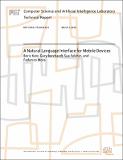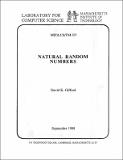Browsing Computer Science and Artificial Intelligence Lab (CSAIL) by Title
Now showing items 2144-2163 of 3804
-
The N2 Corpus v1.0
(MIT CSAIL, 2014-03-22)The N2 Corpus (Narrative Networks Corpus) comprises 100 story texts (42,480 words) relevant to Islamist Extremism, drawn from religious stories, online material, and promotional magazines. The corpus has been annotated for ... -
NAIVE - Network Aware Internet Video Encoding
(1999-04)The distribution of digital video content over computer networks has become commonplace. Unfortunately, most digital video encoding standards do not degrade gracefully in the face of packet losses, which often occur in a ... -
Naive Physics, Event Perception, Lexical Semantics, and Language Acquisition
(1993-04-01)This thesis proposes a computational model of how children may come to learn the meanings of words in their native language. The proposed model is divided into two separate components. One component produces semantic ... -
Naive Problem Solving and Naive Mathematics
(MIT Artificial Intelligence Laboratory, 1983-06)AI problem solvers have almost always been given a complete and correct axiomatization of their problem domain and of the operators available to change it. Here I discuss a paradigm for problem solving in which the problem ... -
The Named-State Register File
(1993-08-01)This thesis introduces the Named-State Register File, a fine-grain, fully-associative register file. The NSF allows fast context switching between concurrent threads as well as efficient sequential program performance. ... -
Naming and Directory Issues in Message Transfer Systems
(1984-07)A message transfer system requires some means for users to determine the addresses of their correspondents. A Directory Service aids users in identifying a particular correspondent and the correspondent's address. In this ... -
Naming and Protection in Extendable Operating Systems
(1974-11)The properties of capability-based extendible operating systems are described, and various aspects of such systems are discussed, with emphasis on the conflict between free distribution of access privileges and later ... -
Naming and Synchornization in a Decentralized Computer System
(1978-10)In this dissertation a new approach to the synchronization of accesses to shared data objects is developed. Traditional approaches to the synchronization problems of shared data accessed by concurrently running computations ... -
Natural Language Based Inference Procedures Applied to Schubert's Steamroller
(1991-12-01)We have previously argued that the syntactic structure of natural language can be exploited to construct powerful polynomial time inference procedures. This paper supports the earlier arguments by demonstrating that a ... -
Natural Language Input for a Computer Problem Solving System
(1964-03-01)This paper describes a computer program which accepts and "understands" a comfortable, but restricted set of one natural language, English. Certain difficulties are inherent in this problem of making a machine "understand" ... -
Natural Language Input for a Computer Problem Solving System
(1964-09-01)The STUDENT problem solving system, programmed in LISP, accepts as input a comfortable but restricted subset of English which can express a wide variety of algebra story problems. STUDENT finds the solution to a large ... -
Natural Language Input for a Computer Problem Solving System
(1964-09)The STUDENT problem solving system, programmed in LISP, accepts as input a comfortable but restricted subset of English which can express a wide variety of algebra story problems. STUDENT finds the solution to a large ... -
A Natural Language Interface for Mobile Devices
(2018-03-01)Creating a robust, automated capability to respond to natural language requests has been a longstanding goal in the development of intelligent systems. This article describes the StartMobile system, originally developed ... -
Natural Language Syntax and First Order Preference
(1989-10-01)We have argued elsewhere that first order inference can be made more efficient by using non-standard syntax for first order logic. In this paper we show how a fragment of English syntax under Montague semantics provides ... -
Natural Learning
(1981-10-01)This memo reports the results of a case study into how children learn in the absence of explicit teaching. The three subjects, an eight year old, a ten year old and a thirteen year old were observed in both of two ... -
Natural Object Categorization
(1987-11-01)This thesis addresses the problem of categorizing natural objects. To provide a criteria for categorization we propose that the purpose of a categorization is to support the inference of unobserved properties of objects ... -
Natural Random Numbers
(1988-09)We present a method for generaing random numbers from natural noise sources that is able to produce random numbers to any desired level of perfection. The method works by transducing a physical noise source to generate a ... -
Nature Abhors an Empty Vacuum
(1981-08-01)Imagine a crystalline world of tiny, discrete "cells", each knowing only what its nearest neighbors do. Each volume of space contains only a finite amount of information, because space and time come in discrete units. ... -
Near-Optimal Distributed Failure Circumscription
(2003-08-11)Small failures should only disrupt a small part of a network. One wayto do this is by marking the surrounding area as untrustworthy ---circumscribing the failure. This can be done with a distributedalgorithm using ...



















